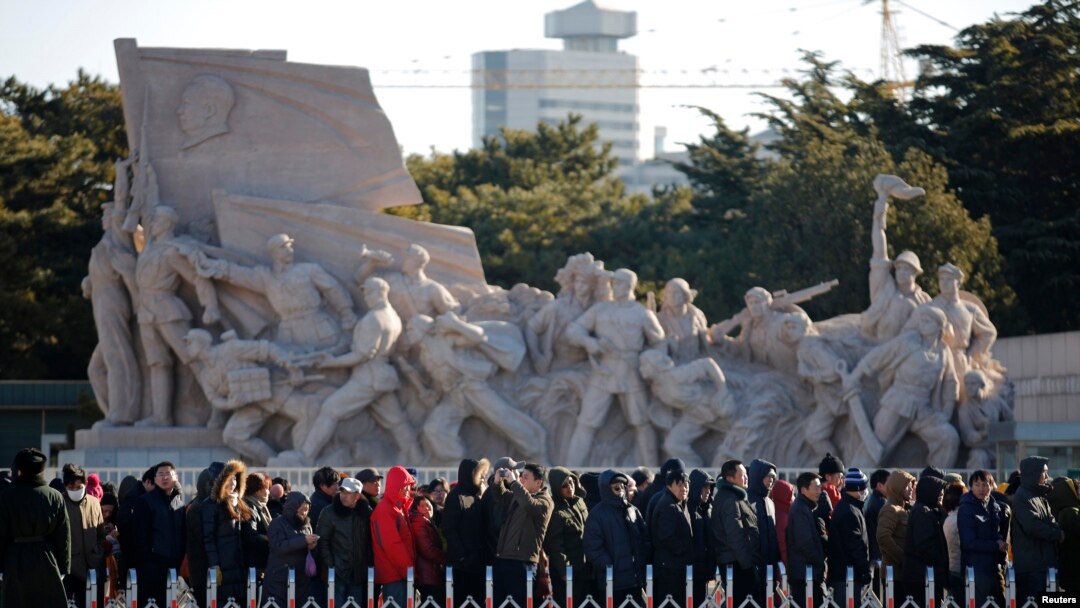China on Thursday observes the 120th anniversary of the birth of Mao Zedong, who enjoys a mixed legacy in the country whose government he founded and led for nearly three decades.
Since his death in 1976, the official government position has been to recognize Mao's contributions as 70 percent positive and 30 percent negative.
A poll by the state-run Global Times suggests Chinese view him even more positively than that, with 85 percent of respondents saying Mao's merits outweigh his mistakes.
Mao's supporters, many of whom tend to be older and remember his rule, say he helped free China from foreign influence, pulling it out of chaos to create a unified country.
But others blame him for the deaths of tens of millions as a result of controversial social experiments such as the Great Leap Forward and the Cultural Revolution.
William Sharp, a professor of East Asia Studies at the Hawaii-Pacific University, tells VOA Mao's legacy remains unexamined, partly because of the government's control over the debate.
"His rule had moments that were greatly tumultuous," he said. "The Great Leap Forward in the mid 1950s saw the death of about 30 million people. And this is still a topic that's taboo for public discussion in China."
Even still, those critical of Mao's legacy seem to be increasing. The Global Times poll suggested the younger and more educated are less likely to revere the revolutionary leader.
Confronting the socialist elements of Mao's legacy is also complicated for Chinese leaders, who have undertaken a series of market reforms since his death.
To deal with this contradiction, Beijing has referred to China's hybrid form of economy, as not just socialist, but "socialist with Chinese characteristics."
The reforms have brought great wealth to China, but they have also come with a rise in corruption and waste that has prompted a fierce public backlash.
Reflecting these sensitivities, Chinese President Xi Jinping has called for solemn, simple and pragmatic celebrations to mark Mao's birthday.
Gordon Houlden of the University of Alberta's China Institute says this is consistent with Xi's crackdown on corruption within Communist Party ranks.
"On the other hand, there's a nervousness about too much adulation of Mao, partly because he stood for a very different sort of China than one finds now in 2013," he said. "So I think for that reason, it's in the political interests for the current president to not let society or fans of Mao get carried away and emphasize a different sort of China than he had in mind."
But Houlden says China's growing global stature means Mao will remain a key figure of the 20th century, as well as a longstanding figure of importance within China.
Since his death in 1976, the official government position has been to recognize Mao's contributions as 70 percent positive and 30 percent negative.
A poll by the state-run Global Times suggests Chinese view him even more positively than that, with 85 percent of respondents saying Mao's merits outweigh his mistakes.
Mao's supporters, many of whom tend to be older and remember his rule, say he helped free China from foreign influence, pulling it out of chaos to create a unified country.
But others blame him for the deaths of tens of millions as a result of controversial social experiments such as the Great Leap Forward and the Cultural Revolution.
William Sharp, a professor of East Asia Studies at the Hawaii-Pacific University, tells VOA Mao's legacy remains unexamined, partly because of the government's control over the debate.
"His rule had moments that were greatly tumultuous," he said. "The Great Leap Forward in the mid 1950s saw the death of about 30 million people. And this is still a topic that's taboo for public discussion in China."
Even still, those critical of Mao's legacy seem to be increasing. The Global Times poll suggested the younger and more educated are less likely to revere the revolutionary leader.
Confronting the socialist elements of Mao's legacy is also complicated for Chinese leaders, who have undertaken a series of market reforms since his death.
To deal with this contradiction, Beijing has referred to China's hybrid form of economy, as not just socialist, but "socialist with Chinese characteristics."
The reforms have brought great wealth to China, but they have also come with a rise in corruption and waste that has prompted a fierce public backlash.
Reflecting these sensitivities, Chinese President Xi Jinping has called for solemn, simple and pragmatic celebrations to mark Mao's birthday.
Gordon Houlden of the University of Alberta's China Institute says this is consistent with Xi's crackdown on corruption within Communist Party ranks.
"On the other hand, there's a nervousness about too much adulation of Mao, partly because he stood for a very different sort of China than one finds now in 2013," he said. "So I think for that reason, it's in the political interests for the current president to not let society or fans of Mao get carried away and emphasize a different sort of China than he had in mind."
But Houlden says China's growing global stature means Mao will remain a key figure of the 20th century, as well as a longstanding figure of importance within China.


